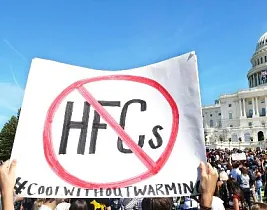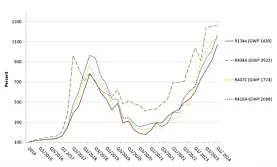China began officially implementing its hydrofluorocarbon (HFC) import and export licensing system as of 1 November 2021, one and a half months earlier than the date stipulated by the Kigali Amendment to the Montreal Protocol, according to a recent announcement jointly made by China’s Ministry of Ecology and Environment (MEE), the Ministry of Commerce (MOC) and the General Administration of Customs (GAC). This major milestone follows the release of China’s revised Import and Export Catalogue of Controlled Ozone Depleting Substances (ODS), which added HFCs to the list of substances whose trade is closely managed by the country in accordance with the Montreal Protocol.
8230An effective and operational government system for licensing the import and export of new, used, recycled and reclaimed controlled substances is crucial for ensuring national compliance with commitments under the Protocol. It enables a country to manage its supply of controlled substances by monitoring and controlling their movement over the national borders and is necessary for collecting data that each country must report under the treaty. Licensing systems are also tools for preventing illegal shipments and avoiding unauthorized or unwanted trade in the controlled chemicals.
Each Party to the Protocol's Kigali Amendment must establish and implement an HFC import and export licensing system within three months of the date of entry into force of the Amendment. On 17 June 2021, the Permanent Mission of China to the United Nations deposited its acceptance letter of the Kigali Amendment with the Secretary-General of the United Nations. China became the 122nd Party to the Amendment when that instrument entered into force on 15 September 2021.
To ensure smooth implementation of the HFC import and export licensing system, MEE, 8230_1together with MOC and GAC, conducted a series of preparatory activities including updating the existing Import and Export Paperless Management System on Controlled Substances under the Montreal Protocol and incorporating HFCs into the system. China’s National Management Office of ODS Import and Export collected information on domestic enterprises that import and export HFCs through various channels and established contact with the enterprises in advance. Through the country's HFC phase-down Enabling Activities project, the customs capacity building project and annual training programme, training plans were developed, and training workshops were organized for management personnel from MOC and GAC as well as HFC import and export enterprises, which comprehensively introduced management requirements on controlled substances as stipulated by the Montreal Protocol and practice of China's import and export licensing system.
China is the largest producer and exporter of HFCs in the world, and its trade involves exchanges with more than 120 countries. A senior official from MEE said that China is willing to extensively cooperate with relevant international organizations and countries on HFC import and export management, strengthen information exchange through mechanisms such as the Informal Prior Informed Consent (iPIC) mechanism managed by OzonAction, and contribute to promoting global compliance.
Patricia Kameri-Mbote, Director of UNEP Law Division, stated "UNEP heartily congratulates China on reaching this important milestone – even ahead of schedule – and commends the Government for the measures it has put in place for controlling imports and exports of HFCs. This is important for both the Montreal Protocol and for protecting our climate since many HFCs are also powerful greenhouse gases. Given China's position as the major producer of HFCs, the effect of its new licensing system will literally be felt around the world." She added, "UNEP also appreciates China’s longstanding use of both formal and informal communication channels, like the iPIC mechanism, to promote compliance with licensing systems at home and abroad. Cooperation across borders makes national licensing systems work even better."




